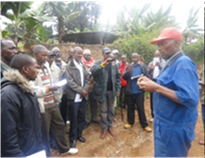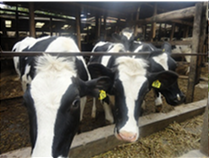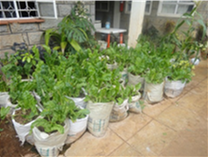GBM Blog
When problems become opportunities- A field trip by Samburu Elders:
‘Patience builds’; these were the words of Mwalimu Lawerance Njuguna, a retired teacher for 30 years. He has trained adults for over 17 years at his farm, in Kiambu County. As we entered his ¼ hectare land brought in 1967 compound in Wagige village.
Kiambu, an electoral county, sits in the footholds of Wagige, North of Nairobi and is one of the country’s biggest landmarks. The region is one of mixed fortune, Where one part serves as the ‘breadbasket of Kenya’, whilst the other is home to cyclical droughts, largely barren, chapped and rocky-just like many other parts of Kenya.
Amid the melancholy, Mwalimu has something to smile about. He has benefited from his 30 cows and his farming. This has allowed him to farm all year round in a relatively dry environment by creating silage animal feed storage that can stay for almost 10 years, use of cow dung as Bio-gas at his household.
Inside his compound, lies his source of happiness – the 1.4 acres of land that allows him to earn a living.
A piece of land that he had given hopes for, owing to the consistent harvest from his cows which produce 40 litres of milk that he sells, interested party (s) that would like to purchase his calves he sell them at Ksh. 200,00/=. He breeds his cows by use of Insemination procedure.
 |  |  |
Mwalimu tells us, beaming with pride as he shows us around his green farm.
He now harvests potatoes, bananas, kales, spinach and lettuce for local consumption with the support of his wife through kitchen garden initiative. He has travelled to countries like Holland and United States to learn more about livestock management.
With content apparent in his voice, he informs us that he gets over Ksh. 2000/= a day; a sum he would never have been able to earn from his jobs being a teacher.
‘The dream to have the project was conceived in 1967 and came into operation due to lack of financial support’, informs 68-years old Mwalimu while giving us a historical overview of the project success.
In the neighbouring, his sons have also benefited of the project explains to us the impact the project has had on his ability to support himself, wife and his four children.’ Before his wife only grew maize and beans, but now they grow, potatoes, onions, spinach, cabbages and kales. They grow enough food to feed themselves and have even managed to educate all his children, even affording university education for them, something he couldn’t have imagined’ as Mwalimu informs us, the happiness in his voice is evident. The quarter acre of land, Mwalimu owns, has flourished their lives and he hopes the elders will take up what they have learnt and stop cattle rustling, enter into agricultural practices for sustainable livelihood.
In a region where the sole earning comes from a piece of land. The Elders from Samburu are usually gripped by the recurring threat of drought, a new source of farming brings hope, and it is of great help to community that is coping struggling with challenges.
All Mwalimu, ever wanted was a source of earning, and the rest they were able to figure out for themselves. They sought assistance not dependency. As we leave the homestead, the elders left as a witness realized that overgrazing is a problem, they would rather have a fewer cows and the productivity is viable as an opportunity, this they saw as proof that by investing also in other agriculture practices like the kitchen garden. We can support communities to adapt to the changing climate.
